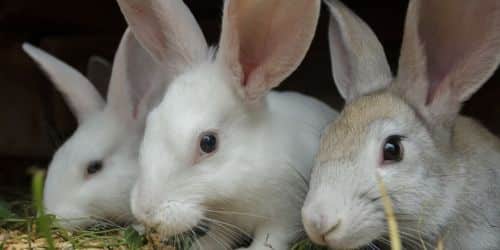Commercial rabbit farming (sometimes referred to as cuniculture or rabbit production) is not a new commercial venture. In the past few decades, people have been using rabbits as a kind of transportation. Starting this business is quite simple; even beginners can do so. Starting a rabbit farming business, like Nigerian poultry farming, does not require a large capital investment, and the turnover period is likewise short. As a result, beginning a business with rabbits is great for you. We have taken an effort to curate methods that will help you get started with rabbit farming in Nigeria.
What Is A Rabbit?
Rabbits are small animals in the Leporidae family that are extensively utilized for meat, fur, and pets. Oryctolagus cuniculus is the scientific name for the domesticated rabbit.
What Is Rabbit Farming In Nigeria?
Rabbit farming is the commercial rearing and production of rabbits for the purpose of selling. They can be bred to sell their meat or fur. In the production of rabbits, this form of animal farming does not incur much expenses. Furthermore, the nature of rabbits and their breeding preferences will undoubtedly be of great assistance to you.
It can be a sustainable way to provide a family with protein-rich, high-quality meat. In comparison to a cattle farm, a rabbit farm requires less acreage and can generate a reasonable income, even on a part-time basis, with a minimal investment. Rabbits can be raised for their meat as well as their hide and fur, which can be used to manufacture clothing or other products.
Anyone who wants to produce livestock for a living should consider starting a rabbit production business. A farmer with no land will benefit from this trade because it requires little area. Young adults who are unsure of their educational path can benefit from farming life. A stay-at-home mother can care for the rabbits while still entertaining her children.
There are two methods for raising rabbits. To protect the rabbits from predators and the outdoors, both systems require a shed or shelter. When raising a limited number of rabbits, a Deep Litter System is used.
Benefits of Rabbit Farming In Nigeria and Africa
The following are the major advantages of rabbit farming in Nigeria and Africa:
- Low startup costs: Compared to other animal farming, rabbit farming has a lower initial cost, making it a more accessible alternative for small-scale farmers.
- High reproductive rate: Rabbits have an extremely high reproductive rate, with a gestation period of 28-31 days and the ability to produce many litters per year. Farmers benefit from this because it is a more profitable choice.
- Low feed costs: Because rabbits are herbivores, they may eat a range of plant-based diets, which can help farmers save money on feed.
- High-quality meat: Rabbit meat is a lean and healthy source of protein with low fat and cholesterol content, making it a popular choice among customers.
- Several product options: Rabbit farming yields not only meat but also fur that can be used to make apparel and accessories.
- Sustainable farming option: Rabbit farming is a more sustainable livestock farming choice, with a lower carbon footprint and less water usage than traditional livestock farming.
- Easy to handle: Rabbits are small, docile animals that are easy to handle, making them an excellent choice for children or adults with limited farming expertise.
- Fast growth rate: Rabbits have a fast growth rate, reaching market weight in 2-4 months, making them a more profitable option for farmers.
Types Of Rabbits Used For Rabbit Farming In Nigeria
Various breeds are available all around the world. Some are extremely productive. According to our climate, some breeds are ideal for farming in Nigeria. The most productive and appropriate rabbit breeds are given below. You may select any of those breeds.
- White Giant
- Grey Giant
- Flemish Giant
- New Zealand White
- New Zealand Red
- Californian
- Dutch
- Siviet Chinchilla.
How To Start Rabbit Farming In Nigeria
Rabbits are tiny mammals. So starting a commercial rabbit farming business is quite simple. Before you begin, create a proper business plan. The following sections describe the most significant phases in launching a commercial rabbit farming enterprise.
#1. Complete a Rabbit Farming Training
Because of its profitability and ease of maintenance, rabbit farming has grown in popularity in recent years.
To succeed, however, like with any other farming business, sufficient training and knowledge are required.
#2. Make a Rabbit Farming Business Plan
Then, create an excellent business plan. A business plan helps you run the farm precisely, and if you stick to the plan, you will be able to make good profits. In order to create a viable rabbit business plan, seek the assistance of an expert. And keep in mind that you will need to include terms like Executive Summary, Market Analysis, Products and Services, and a slew of others, where you will go into detail about your company.
#3. Select a Good Location for Your Rabbit Farm
You must choose an excellent location for your commercial rabbit-producing enterprise. Choose a quiet location away from residential areas. Ascertain that a good marketing and transportation system is available near your chosen locale.
The greatest locations for rabbit farming are in warm temperature regions with enough of water, enough space, feed availability, and a high demand for rabbit meat.
Proper planning, research, and management are critical for the rabbit farming business’s success. Rabbit farming can provide farmers with a viable and sustainable source of income while also helping to produce high-quality protein for human consumption.
#4. Determine the Products You Want to Produce
Rabbit products from commercial farming have grown in popularity in recent years because to their nutritional content and long-term viability. Rabbit meat is a low-fat, cholesterol-free protein source, making it a good choice for health-conscious consumers.
Furthermore, rabbit farming is less harmful to the environment than other forms of animal husbandry since rabbits have a lower carbon footprint and use less space and water than larger cattle.
The term “rabbit farming” refers to the practice of rearing animals for the purpose of making money. Rabbits are often kept in huge, climate-controlled facilities where they have access to food, water, and medical treatment. To ensure they get all the nutrition they need to develop and thrive, they are fed a diet of specially prepared pellets, hay, and fresh vegetables.
#5. Choose the Right Rabbit Breeds
There are numerous rabbit breeds available all around the world. Dark Gray (internal), Fox, Dutch, New Zealand White, New Zealand Black, New Zealand Red, Belgium White, and Chinchilla are among the most productive and popular breeds. Depending on the availability of breeds in your location, you can select the best breed for your production.
Choosing the appropriate breed, by the way, can make all the difference in commercial rabbit farming. Some rabbit breeds are better suited for meat production than others, and not all rabbits are created equal.
#6. Choose the Right Production Method
Both deep litter and cage farming methods can be used to start growing rabbits. Raising methods include the Deep Litter Method, the Cage Method, the Colony Method, the Pasture Method, the Indoor Method, and the Tractor Method.
#7. Housing
A vital part of the commercial rabbit farming operation is adequate rabbit housing. Comfortable, healthy, and productive rabbit housing is essential.
Commercial rabbit housing often entails housing rabbits indoors in big facilities intended to meet these animals’ needs.
#8. Feeding
Feed consumption rate and nutrient requirements differ based on the age and breed type of the rabbit. Adult rabbit chow should have 17 to 18 percent crude protein, 14 percent fiber, 7 percent minerals, and 2700 kilo calories/kg metabolic energy.
The term “green” refers to a type of vegetable that is used to describe a plant. You can feed them chicken feed for business purposes.
In addition to giving a healthy feed, provide them with an adequate amount of clean and fresh water based on their needs. Rabbits are herbivores, therefore they need a diet high in fiber and low in fat and protein.
#9. Breeding
Within 5 to 6 months of age, a rabbit will typically reach maturity and be ready for breeding. However, do not utilize male rabbits for breeding until they reach their first birthday.
This ensures high-quality baby bunnies for commercial production. Always attempt to breed healthy rabbits with appropriate body weight. If the ladies are sick, never breed them.
Take extra care of the breeding male rabbits and pregnant female rabbits, and provide them with nutritious food. Rabbits have a 28–31 day gestation cycle. And a doe can have 2 to 8 children each time she gives birth.
#10. Caring
Taking appropriate care of the animals is critical to the success of a rabbit-producing enterprise. Good care not only keeps the bunnies happy but also helps them grow.
Keep a close eye on their health and attempt to maintain regular touch with a veterinarian in your neighborhood. Housing, nutrition, medical care, socialization, and biosecurity are all important aspects of rabbit care.
#11. Diseases & Their Prevention
Rabbit infections can be a serious concern for commercial rabbit producers, affecting their animals’ health and productivity. Prevention is essential for sustaining rabbit health and preventing illness spread.
Vaccination is one of the most effective strategies to avoid rabbit illnesses. Vaccinations can protect rabbits from a variety of diseases, including rabbit hemorrhagic disease (RHD) and myxomatosis.
Vaccination regimens might vary based on the specific vaccine and the age and condition of the rabbits, so it’s critical to design a vaccination strategy for your rabbits in collaboration with a veterinarian. Good hygiene and sanitation are also important in reducing illness spread. Rabbit facilities should be maintained clean and dry, with cages and equipment cleaned and disinfected on a regular basis.
#12. Rabbit Vaccinations
Because of their adorable appearance and gentle demeanor, rabbits are becoming increasingly popular as pets. However, they, like all animals, are susceptible to infections that can endanger their health and even kill them. Vaccination is a crucial strategy in keeping your bunny healthy and preventing many diseases.
To determine the appropriate immunization regimen for your pet, speak with a veterinarian who is acquainted with rabbit care. Your rabbit can have a long and healthy life if properly vaccinated and cared for.
#13. Advertising and marketing
When you are confident that you can complete all of these tasks, you can take your bunnies on the road. Marketing rabbit products can be difficult in some locations. As a result, it is preferable to develop your marketing strategy before you begin. You could look at your local markets or the nearest town.
Rabbit Farming Advantages and Disadvantages
Rabbit farming has various advantages, including high productivity, inexpensive start-up costs, and a small footprint. Rabbits are effective feed-to-meat converters, with a high reproductive rate and rapid growth rate.
They are also relatively simple to maintain, requiring little infrastructure and equipment. Rabbit meat is lean and low in cholesterol, making it an excellent source of protein.
However, there are certain drawbacks to rabbit farming, such as the requirement for specific knowledge and skills, the possibility of disease outbreaks, and a restricted market demand for rabbit meat. Rabbits are vulnerable to predation, thus proper housing and security measures are required.
How to Start Rabbit Farming Business?
First and foremost, locate a decent location for your business, then select the appropriate rabbit breeds, build a home for them, feed them healthy food, and always try to take good care of your bunnies.
Is Rabbit Farming a Profitable Business?
Yes, absolutely! Commercial rabbit production is a lucrative enterprise. The most fascinating fact is that “rabbits grow very quickly.” And you’ll be able to start selling and making money in a very short time (often as little as 3 months).
Is Rabbit Farming for Meat Profitable?
Commercial rabbit production is often done primarily for meat production. And rabbit meat production is unquestionably profitable.
How Do You Farm Rabbits?
First and foremost, locate a decent location for your business, then select the appropriate rabbit breeds, build a home for them, feed them healthy food, and always try to take good care of your bunnies.
How Many Rabbits Do You Need to be Profitable?
It all depends on your financial situation. Depending on your budget, you can start with as few as 10 rabbits or as many as hundreds or even thousands of rabbits.
Who Eats Rabbit Meat?
Rabbit meat is widely consumed in many countries. However, China now has the most rabbit meat eaters.
Conclusion
To summarize, rabbit farming is a significant business opportunity in Nigeria and Africa with strong growth and profitability potential. Demand for rabbit meat and other rabbit products like as fur and dung is increasing both locally and internationally, providing farmers with a substantial opportunity.
Related Articles
- AVERAGE DOG INSURANCE COST IN 2023
- Best Online Business Ideas to Try Out in Nigeria 2023
- 18 Most Expensive Dog Breeds in 2023 (Updated)
- Browns Logo: Why Did The Browns Change Their Logo






